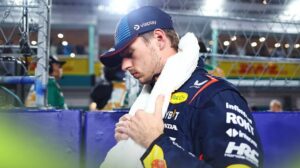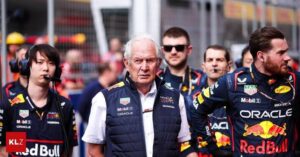Just in:Max Verstappen and Lewis Hamilton’s Abu Dhabi Controversy vs. Schumacher and…….read more

Max Verstappen and Lewis Hamilton’s Abu Dhabi Controversy vs. Schumacher and…….read more
The 2021 Formula 1 season finale in Abu Dhabi will forever be etched in the minds of racing fans, not only for its dramatic conclusion but for the controversial decisions that ultimately handed the World Championship to Max Verstappen. With the title on the line, Verstappen seized his chance on the last lap after a series of contentious decisions by race control, particularly the handling of the safety car. This decision allowed Verstappen, driving for Red Bull, to overtake Lewis Hamilton, thus denying the seven-time world champion the opportunity to surpass Michael Schumacher’s record of titles. The fallout from this race is still a subject of intense debate, with Hamilton’s supporters accusing the sport of unfair treatment and a lack of justice.
However, the Abu Dhabi controversy is not the first time F1 has seen a championship determined in a contentious manner. The 1994 Australian Grand Prix in Adelaide remains another dark chapter in F1’s history. That race was the setting for one of the most scandalous and debated incidents in Formula 1 history, involving Michael Schumacher and Damon Hill. As the season’s final race, it was pivotal for both drivers. Hill trailed Schumacher by a single point and knew that he needed to win the race to claim the title, making it one of the most dramatic and controversial finishes in the sport’s history.
The 1994 season had already been overshadowed by tragedy and controversy. The sport was still reeling from the death of Ayrton Senna at the San Marino Grand Prix, an event that led to widespread changes in F1’s safety protocols. At the same time, Michael Schumacher was dominating the season, having won three of the first five races. But despite his early success, Schumacher’s path to the championship wasn’t without controversy. After being disqualified from the Belgian and British Grands Prix, and serving a two-race ban, Schumacher found himself under increasing pressure from Hill, who took advantage of Schumacher’s misfortune by winning the Japanese Grand Prix, setting up a dramatic showdown at Adelaide.
On race day, the drama only intensified. Nigel Mansell, driving for Williams, started on pole position ahead of Schumacher and Hill, but he quickly fell behind as Schumacher and Hill overtook him. With the title on the line, Hill knew that he had to pass Schumacher to secure the championship. On the second lap of the race, Hill made an ambitious move on the inside of Schumacher as they approached the right-hand turn. However, Schumacher, sensing Hill’s challenge, moved aggressively across the track, forcing Hill to make contact with his car. The collision sent Schumacher off the track, and he was out of the race. Hill, despite continuing, was forced to pit for repairs after suffering suspension damage from the impact. His race ended soon after, as the Williams mechanics failed to repair the damage in time.
What followed was a moment that still divides opinion among F1 fans and experts. As Hill limped back to the pits, Schumacher waited near the corner, knowing that Hill’s race was over. Schumacher’s reaction, which appeared to be a barely concealed smile, suggested that he knew the outcome before Hill did: a non-finish for Hill meant Schumacher was now World Champion. The decision not to penalize Schumacher for his actions raised many eyebrows, and the incident became one of the most controversial moments in F1 history.
To this day, the exact circumstances surrounding the collision remain a mystery. Some have speculated that Schumacher’s car was already damaged before the incident, but no definitive evidence has emerged to confirm this. However, what remains clear is that Schumacher’s actions on the track raised serious ethical questions, leading to his disqualification from the 1997 World Championship after a similar incident with Jacques Villeneuve. The 1994 incident highlighted a lack of oversight from race officials, and it became an emblem of the chaotic and unpredictable nature of F1 during that era.
In hindsight, comparing the Abu Dhabi 2021 controversy to the Schumacher-Hill scandal of 1994 is difficult. While both races involved contentious decisions that ultimately influenced the title race, the 1994 incident arguably had a more profound impact on the sport. The absence of adequate race control and the failure to penalize Schumacher for his actions left a stain on the season, which was further compounded by Schumacher’s later actions in 1997.
Despite the intense social media scrutiny surrounding the 2021 Abu Dhabi Grand Prix, where Verstappen’s last-lap victory became the subject of intense debate, it arguably does not carry the same weight as the 1994 scandal. The Schumacher-Hill incident marked a turning point in F1’s history, as it highlighted the sport’s vulnerability to manipulation and unfair tactics. Even though the Abu Dhabi outcome remains controversial, the Schumacher-Hill collision is still viewed by many as F1’s greatest championship scandal—a legacy that is now 30 years old, but remains as divisive as ever.






